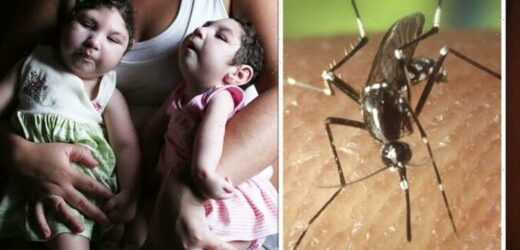Zika: CDC outline symptoms of the condition in 2018
We use your sign-up to provide content in ways you’ve consented to and to improve our understanding of you. This may include adverts from us and 3rd parties based on our understanding. You can unsubscribe at any time. More info
Zika virus is a mosquito-borne disease whose infection of developing foetuses can cause serious birth defects like microcephaly, the development of a smaller-than-normal head which is associated with impaired intellectual development and motor function issues. In contrast, in adults, the virus is typically symptomless or only causes mild symptoms — such as fever, joint pain, headache, rashes and red eyes — that rarely last for more than a week. Zika belongs to the same viral family as the similarly mosquito-borne dengue fever, meaning that exposure to the latter can afford protection against the former.
Paper author and virologist Professor Sujan Shresta of California’s La Jolla Institute for Immunology said: “In areas where Zika is prevalent, a vast majority of people have already been exposed to dengue virus and have both T cells and antibodies that cross-react.”
Unfortunately, she explained, both viruses are also quick to mutate.
She added: “Dengue and Zika are RNA viruses, which means they can change their genome.
“When there are so many mosquitoes and so many human hosts, these viruses are constantly moving back and forth and evolving.”


In their study, Prof. Shresta and her colleagues set out to take a closer look at how Zika naturally and rapidly evolves as it encounters more hosts.
To do this, they recreated infection cycles in the laboratory that repeatedly switched back and forth between cultured mosquito cells and mice.
They found that it was relatively easy for Zika virus to acquire one particular amino acid change that allowed it to make more copies of itself, which in turn would allow infections to take hold more easily.
This mutation — which has been designated “NS2B I39V/I39T” — was found to boost the virus’ replication ability in both mosquito cells, mice and human cells.


Paper author and biochemist Professor Jose Angel Regla-Nava of the University of Guadalajara, Mexico said: “This single mutation is sufficient to enhance Zika virus virulence.
“A high replication rate in either a mosquito or human host could increase viral transmission or pathogenicity — and cause a new outbreak.”
Prof. Shresta added: “The Zika variant that we identified had evolved to the point where the cross-protective immunity afforded by prior dengue infection was no longer effective in mice.”
“Unfortunately for us — if this variant becomes prevalent — we may have the same issues in real life.
“The world should monitor the emergence of this Zika virus variant.”
DON’T MISS:
Solar storm: Blackout risk as NASA wants of ‘direct hit’ on Earth [ANALYSIS]
Japan humiliates EU with blueprint to cut Russia ties [INSIGHT]
Solar storm warning: ‘Radiation risk’ as ‘major’ event rocks Earth [REPORT]

With their initial study complete, the researchers are already looking for ways to prepare for the emergence of such a dangerous new variant through tailored treatments and vaccines.
They will also be working to learn exactly how the mutation they identified helps Zika to replicate itself more effectively.
Prof. Shresta said: “We want to understand at what point in the viral life cycle this mutation makes a difference.”
The full findings of the study were published in the journal Cell Reports.
Source: Read Full Article


